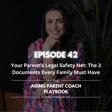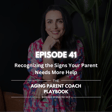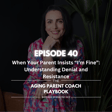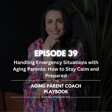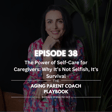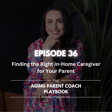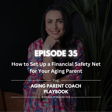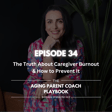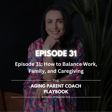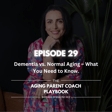Become a Creator today!Start creating today - Share your story with the world!
Start for free
00:00:00
00:00:01

Episode 12:Helping Aging Parents Transition Away from Driving: A Compassionate Guide
Description:
In this episode of The Aging Parent Playbook, we dive into the sensitive but crucial topic of helping your aging parents transition away from driving. Discover how to approach this emotionally charged conversation with empathy, recognize warning signs, involve healthcare professionals, and provide practical transportation alternatives. Learn strategies to ensure your loved one's safety while maintaining their independence and dignity. Tune in for actionable insights and thoughtful advice to navigate this challenging yet necessary journey.
Transcript
Introduction to Aging Parents and Driving
Impact of Driving Loss on Seniors
00:00:38
Speaker
Welcome to another episode of the Aging Parent Playbook, where we provide guidance on the complex challenges of caring for aging loved ones. Today, I'm going to address a particularly sensitive issue, assisting your aging parents in transitioning away from driving. Sounds complicated, huh? Yes, it can be. This conversation is often fraught with emotional and practical concerns, but If we approach it carefully and with empathy, it can lead to better and safer outcomes for everyone. So before anything, let's talk about what driving means, right? So for many seniors and for most adults, um even though we may not be aware of it, driving symbolizes independence and freedom.
00:01:29
Speaker
The prospect of giving up one's driver's license can feel like a profound loss, right? That um they're gonna lose touch with the outside world. They're gonna lose their independence. It can impact their self-esteem and most definitely impact their daily routines. So it's really important to recognize the emotional weight that this transition, right? um Can have when we talk about approaching the subject.
00:02:00
Speaker
You know, so,
Approaching Driving Cessation
00:02:02
Speaker
and as we come into the holiday season, right, where it may be time that you may be spending more time with your aging parent, it's good to be observant, right? And I call this a quiet observation, right? Just be looking and trying not to make it too obvious, because, I mean, the last thing you want is your parent asking you, what are you looking at? What are you searching for? But, you know, um really looking at, have there been frequent close calls, right?
00:02:28
Speaker
Or have they been experiencing near misses? right Or are they have have they received multiple traffic tickets? um And it really takes a lot of trust for your parents to also talk to you about this. And we want to kind of invite that safety. right are have they had Have they mentioned any difficulty? Or has your their spouse or somebody else told you about them having difficulty navigating familiar routes?
00:02:55
Speaker
right um that can also be problematic, right? Are they exhibiting physical limitations, right? You know, and technology has been wonderful because now we no longer have to do the looking back over the shoulder to look back, right? But even just navigating using the um the monitor to look at the rear the rear camera, right? Are there visual impairments, right? are And our is house,
00:03:29
Speaker
How diminished are their reaction times? right Because in normal aging, there's slower reaction times, right but how much slower? Is it something that's impactful? right And how is their cognition? right Are they still able to navigate complex um issues? right like Are they able to navigate a four-way stop well? right Are they able to merge onto oncom like into a highway?
00:03:58
Speaker
right And as
Involvement of Healthcare Professionals
00:04:00
Speaker
as we age, you know, many adults, many aging adults self kind of um regulate that and they stop driving on highways. They only go into like on the streets, right? Where they feel they have less, they have more control, less speeding, right? More ability to stop if necessary, right? So if you do notice any of these, right? It is really important to approach approach at the right time, right? Choose the right moment. That's like in all conversations in life. It's about the time is really, you know, really important. And it's always important, especially when bringing up a sensitive topic is to start with I statements, you know, I've noticed um that
00:04:52
Speaker
your driving has changed a little bit, or I've noticed, um or I'm concerned about your safety, right? And provide specific examples. Because of course, when they say I'm concerned about your safety, the the response is gonna be, you're crazy, or what do you mean? What are you talking about? Right, and to have specific examples, and try to not be, it doesn't have to be like a police report,
00:05:21
Speaker
on July 15th at 10, 17 a.m.,
Dealing with Resistance and Legal Aspects
00:05:25
Speaker
this event occurred, right? But, you know, general and kind of more casual, right? um And if at all possible, it is really good if you if this can happen with a healthcare care professional, right? if you were if you um If you go with your parent to their primary care doctor, right? And you say, hey, you know, I've been noticing there's been some challenges What do you think, right? Because what's would um what a doctor or what a physician can do is offer an objective evaluation of how they're um they're doing, right? we can We can order testing that involves um
00:06:09
Speaker
testing their cognitive, right? There's even testing that involves actually literally driving. It's usually done by ah physical medicine and rehabilitation, right? It's ah it's a test to see what how the reaction times are. And it usually starts with them doing a simulated driving test on a computer, right? If they pass that, um then someone may go on the field with them, right? And this is a wonderful tool to be able to really give concrete examples of what's going on. um And, you know, to to have
Planning Alternative Transportation
00:06:39
Speaker
something that's not just mom, I think you're it's time for you to stop driving, right? um So what happens if your parent is like, I'm not gonna talk about it.
00:06:55
Speaker
I'm not, you know, I just, I don't know you're wrong, you're wrong, right? Again, I think it's still important to really bring this up with their doctors, right? um In some states, a doctor will be mandated to report this to the Department of Motor Vehicles if there is a concern about safety, right? And they may have their driver's license revoked. Again, I know that revoking someone's driver's license does not necessarily mean they're gonna stop driving um because they may still want to drive, right? um And, you know, there's, you yourself can report
00:07:36
Speaker
um uh your concerns and it can be done anonymously and for most states yeah i would be hesitant to do that unless it's something very very concerning right um because at the end of the day what we want to do is foster trust and foster communication right because we what we want
00:07:58
Speaker
Because, I mean, it as long as someone' someone else's safety is not being immediately put in at risk, right? um And you may even have to consult an attorney to see what your responsibilities are, um and knowing this information, right? Because then, if God forbid something happens, then if you knew that that your your parent was driving, it could be seen as negligence on your part, right? Again, i'm not ah I'm not an attorney, so I think it'd be best to, depending on state laws, onto, um
00:08:29
Speaker
to talk about that. you know um What is also important is you know if this is what's going to happen, right if your parent is going to stop driving, have at the ready alternative transportation options. my um Some smaller towns have pre-transportation, there's even In some smaller towns, they have like free Uber service like for around the community, like a little shuttle service. There is public transportation. some
00:09:06
Speaker
um some Some older folks may qualify for some transportation transportation services that are subsidized by the state or the federal government, right especially if it goes to medical appointments and they have to pay pay a
Case Study: Daughter Helping Father
00:09:24
Speaker
small fee.
00:09:25
Speaker
right and also talk about you know um taking them places, right about setting a schedule. um Because it can be very overwhelming to think that all of a sudden they're gonna be you know locked in their house or in their home and not be able to leave. you know um And it can be very challenging. It can be very challenging.
00:09:52
Speaker
and um it is it is really important to have this at the ready and know what um the plan is gonna be, right? And um one of my, ah one of the daughters of one of my patients, right? She was very, um but she was my client. And um we spoke about ways of addressing this with her father um because she had noted
00:10:24
Speaker
Um, some dens in his cars, um, nothing major, right? But it was more that the amount of them as opposed to the severity of them. And he had always been a very conscientious, very safe driver. You know, he had, him he himself, he was 84. He himself had stopped driving at night because of not trusting his vision, um, which also diminishes at night. Vision diminishes. Um, and the ability is to to judge distance at night is particularly difficult, especially with the oncoming traffic and the light. um And this starts occurring to everyone, like, I think in like our fifties, sixties, right? So this is not something that's like super late onset, but people just start driving less and less at night as we age, right? Because of these concerns. And um she was able to sit him down and
Compassionate Driving Cessation Strategies
00:11:13
Speaker
this and say, look, I'm really worried.
00:11:15
Speaker
I'm really worried that you're going to hurt yourself. I'm really worried that you're going to hurt somebody else. Um, I know you love driving and you've always been a very conscientious driver and I have these concerns, right? Um, and because not only was he driving himself, he was also driving his wife, her mother, right? And so it was the concern about both of them, right? And, but she had at the ready, this is the options that you have, right?
00:11:40
Speaker
And a voluntary surrender is a much, much, much healthier way of going about things than having um having to take it away, you know? um And because at the end of the day, you know, helping our aging parents retir retire from driving is challenger challenging, but it,
00:12:08
Speaker
is a necessary step to ensure their and the public's well-being and safety. right um We ought to approach this conversation with compassion, um provide practical alternatives, and seek professional guidance when needed. you know the But remember, the ultimate goal is to support your loved one. So thank you for joining me on this episode of the Aging Parent Playbook.
00:12:37
Speaker
Stay tuned for more insights and strategies to navigate the complexities of aging and caregiving. Until next time.
